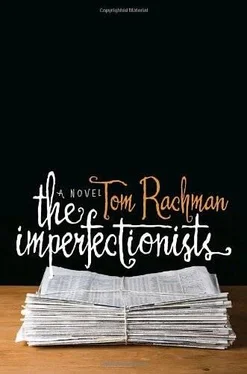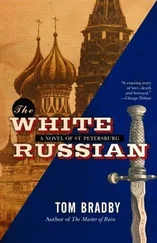Ornella phones her eldest son, Dario, to complain about Marta. "She forgot to bring me down my paper for tomorrow," she tells him in Italian, which is the family language. "What am I going to do now?"
"Can't you get it yourself?"
Ornella flings up her arms, which tinkle with jewelry, and chops the air. "No," she says, "I cannot. You know I can't." What if she read a headline by mistake, something from 1996, or 2002? She doesn't ask Dario to come over, but repeats the problem until he volunteers.
She opens the front door and leans back slightly when he enters, as if to avoid a kiss, though none is offered. His six-year-old son, Massimiliano, trails in. "You're here too, Massi," she says, patting her grandson's head as if he were a rather pleasing spaniel, but a spaniel nonetheless.
Dario sets up the stepladder. She watches the tendons in his wrist flexing as he grips and shifts it into position-she wants to grab his arm and stop him. She can't look at April 24, 1994. No one but she seems to remember that day. She says softly, "Wait, wait."
He turns. "What for?"
"Shall I make us coffee first?"
"Not for me."
"What about the boy?" she says, though Massi is standing right there beside them. "Will he want something?"
"You can ask him-Massi?"
The child, instead of responding, walks away.
"Come with me to the living room," Ornella tells Dario, to delay him "I want to show you something." She hands him the paper of April 23, 1994. "This piece by Lloyd Burko. It's really worth reading."
He smiles. "I won't bother telling you that it's somewhat out of date." He turns the page. "So, what's happening today?" he says wryly, and reads out a few headlines. "God, I remember that."
She watches: Is he making fun of her? He considers me stupid. Well, I am, she thinks, burning at the insult. He looks over, about to speak, but she diverts her gaze fractionally above his sight line, as if reading the wrinkles on his forehead.
"Massi!" she calls out. "Where are you?"
He is all around the room, in the form of framed photographs. Portraits of him and Ornella's three other grandchildren stand on the table, on the mantelpiece, in the crystal cabinet. This is strange, since in person she recoils from the young-when handed a baby, she holds the child as if it were a squirming octopus. But not all the portraits are of kids. A few show her husband, Cosimo, at various postings around the world. He died more than a year ago, on November 17, 2005. Others show Ornella herself, when she was dashing, too thin and too young. (She was only sixteen at the time of her marriage to Cosimo.) She has a different face today, matted with peach foundation, orange lipstick, liner around her eyes, green mascara so thick that when she blinks one sees frog's fingers clasping. Her hair is yellow, dyed at great expense and pulled back in a bun so tight that the canvas of her face appears to be held fast by the knot at the back of her head.
"I should get rid of Marta," she says.
"Don't be mad-she forgot to bring down your paper one day. I'll get it now."
"No, no! Hang on, wait. There's no rush."
"Didn't I come over for that?"
"Yes, but I'm not sure I need it now."
"You can't fire Marta." His mobile phone rings-the digitized sound of a sheep bleating. She frowns: modern technology is not allowed in her house. "Sorry," Dario says, and takes it outside by the elevator.
Massi wanders back in, holding a white rectangular contraption studded with buttons and two unlit gray screens. He must not turn on video games at his grandmother's house.
"Let's go into the kitchen," she says. "And I don't want to see that thing you have there." If you feed children, that works. She sits this one on a chair. His legs dangle and he kicks off one of his Nikes, baring a dirty white sports sock. "What do you like?" she asks. "Are you hungry?"
"Not very."
He hardly eats, this one-Dario said something about that, didn't he? That they struggle to get Massi to finish meals. "Well, you'll have something in my house," she declares and searches the cupboards. "This is grown-up food, mostly." She checks the fridge. "I'll make you pastina in brodo."
"No thank you."
She ignores this and heats the broth. The boy watches his grandmother. Her perfume infuses the kitchen. As the broth simmers, fatty-chicken aroma overwhelms her scent. She turns to Massi, holding a wooden spoon that steams. She sweeps his bangs aside. "You can see now. But your parting is uneven," she says. "I'll fix it for you."
"No thank you."
"I'm good at it." She leans in. He leans back.
He stares at his plastic video game, a Nintendo DS Lite, which he got a few weeks ago. "Can I turn it on?"
"Your food is almost ready."
"I don't want any food."
Ornella doesn't speak for a moment. She switches off the stove. Crushed, she hurries into the living room. She stands motionless, watching the front door, behind which stands her eldest son, laughing into his cellphone.
He comes back inside, still smiling at the exchange that concluded his phone call. "Where's Massi? We should get going."
"I tried to make him eat something. I see what you mean-it's impossible."
Dario is puzzled. "We can't stop him eating."
The boy hobbles out of the kitchen, wearing only one sneaker and engrossed in his video game.
"Turn that off," his father says. The boy does not, stumbling out the front door, too engaged to say goodbye.
"Goodbye," Ornella says nonetheless.
"I meant to tell you who I saw," Dario says, nipping into the kitchen to collect his son's abandoned Nike. "Kathleen Solson." This is his former girlfriend, whom Dario met in 1987 when they were both interns at the paper. "She's back now, back from Washington."
"And how is she?"
"The same. Older."
"I don't want to know anything more."
"This has nothing to do with current events."
"It has to do with the paper. I don't want to know."
"Do you want tomorrow's or not?"
"I'm worried about tomorrow," she says, her voice dropping. "You don't remember, do you."
"Remember what?"
"Marta isn't back until Tuesday."
"And you can't wait till Tuesday to fire her?"
"You misunderstand."
She stands at the bottom of the stepladder, holding it for him. She wants to stop fretting. It's just another date-it's not as if the paper will contain an account of her own life on that day.
He climbs up and looks around the storage space. "It's not here."
"Yes, it is."
He continues searching. "It really isn't. You want to come up and look? It's missing, I promise you."
"I've collected them all," she insists. "I've never missed an edition."
"Well, you'll have to miss one now, I'm afraid. Do you want April 25, 1994? That's here."
"No, I don't. I'm not there yet."
He comes down the ladder and, leaping from the third rung, swoops beside her and kisses her fast on the cheek.
Unprepared, she smiles bashfully, then bats him aside and, catching herself, gets angry. "You could have knocked me over. It's not funny."
The paper's headquarters on Corso Vittorio are a taxi ride from Ornella's home in Parioli. She has never visited, has always been wary of that office, which contains all the world yet is itself contained in a single grubby building. But she has no choice-her storage space does not contain tomorrow, and she must find a copy.
"Che piano?" asks a man with a strong Anglophone accent.
"Not sure what floor," she answers in English. "I'm trying to find the headquarters of the paper."
"Follow me." He closes the elevator gate after them and nudges the third-floor button with his knuckle. The elevator rises.
"You work there?" she asks.
"I do."
"What's your name?"
"Arthur Gopal."
Читать дальше












